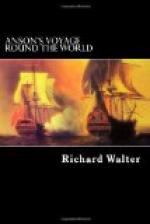CHAPTER 14. THE LOSSES FROM SCURVY—STATE AND PROSPECTS OF THE SQUADRON.
EXTRAORDINARY MORTALITY.
Our people by the beginning of September were so far recovered of the scurvy that there was little danger of burying any more at present; and therefore I shall now sum up the total of our loss since our departure from England, the better to convey some idea of our past sufferings and of our present strength. We had buried on board the Centurion since our leaving St. Helens 292, and had now remaining on board 214. This will doubtless appear a most extraordinary mortality; but yet on board the Gloucester it had been much greater, for out of a much smaller crew than ours they had buried the same number, and had only eighty-two remaining alive. It might be expected that on board the Trial the slaughter would have been the most terrible, as her decks were almost constantly knee-deep in water; but it happened otherwise, for she escaped more favourably than the rest, since she only buried forty-two, and had now thirty-nine remaining alive. The havoc of this disease had fallen still severer on the invalids and marines than on the sailors; for on board the Centurion, out of fifty invalids and seventy-nine marines there remained only four invalids, including officers, and eleven marines; and on board the Gloucester every invalid perished, and out of forty-eight marines only two escaped. From this account it appears that the three ships together departed from England with 961 men on board, of whom 626 were dead before this time; so that the whole of our remaining crews, which were now to be distributed among three ships, amounted to no more than 335 men and boys, a number greatly insufficient for manning the Centurion alone, and barely capable of navigating all the three with the utmost exertion of their strength and vigour. This prodigious reduction of our men was still the more terrifying as we were hitherto uncertain of the fate of Pizarro’s squadron, and had reason to suppose that some part of it at least had got round into these seas. Indeed we were satisfied from our own experience that they must have suffered greatly in their passage; but then every port in the South Seas was open to them, and the whole power of Chile and Peru would doubtless be united in refreshing and refitting them, and recruiting the numbers they had lost. Besides, we had some obscure knowledge of a force to be fitted out at Callao; and, however contemptible the ships and sailors of this part of the world may have been generally esteemed, it was scarcely possible for anything bearing the name of a ship of force to be feebler or less considerable than ourselves. And had there been nothing to be apprehended from the naval power of the Spaniards in this part of the world, yet our enfeebled condition would nevertheless give us the greatest uneasiness, as we were incapable of attempting any of their considerable




